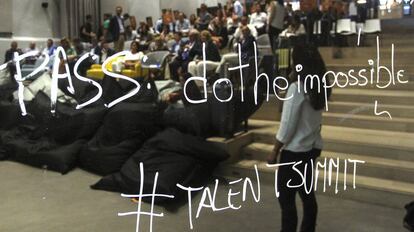Madrid strives to compete with other European tech hubs
Although the Spanish capital still lags behind Barcelona, experts say it has grown at an “astonishing” rate since the financial crisis and expect the city will become even more competitive in the future


Ever since Silicon Valley began to change our world and sweep up huge profits, cities across the globe have been competing to build their own tech hubs. While Madrid is not considered one of Europe’s top startup cities, the industry in the Spanish capital has grown rapidly over the past five years.
Cabify is the only Madrid-based startup worth over $1 billion
Last year, startups in Madrid received €342 million in investment, according to the Digital Startup Ecosystem Overview 2019 report issued by Mobile World Capital Barcelona, a Barcelona-based association focused on developing technology. While this was a record for Madrid – a huge leap from the €60 million it received five years ago – it is still far behind the investment figures in Europe’s leading tech cities (€4.7 billion in London, €2.3 billion in Paris and €2.17 billion in Berlin).
Madrid is home to 1,235 tech startups, but because they are small and relatively new, they do not attract large investments. Barcelona, on the other hand, entered the competition earlier, with some projects launching at the end of the 1990s. The Catalan capital is now home to 1,197 startups and last year it received €871 million in investment – almost double the amount invested in 2017. Barcelona has received more investment than Madrid every year since 2014, according to startup funding rounds, a process to attract private investment.
But experts point out that Madrid and Barcelona share many tech connections, unlike in France and the United Kingdom, where almost all activity is concentrated in the capital. If you add Madrid’s and Barcelona’s figures together, Spain has the markings of a major “startup nation,” a term used by the authors of the Mobile World Capital Barcelona report, or in the words of Prime Minister Pedro Sánchez, a “country of entrepreneurs.”
“This is not a soccer competition between Madrid and Barcelona – here everyone wins,” says Aquilino Peña, a partner of Kibo Ventures, a venture capital firm founded in Madrid in 2012. The company, which has investments in 52 startups, 21 of which are in Barcelona, is an example of this cooperation.
Last year, Madrid’s startups received a record-breaking €342 million in investment compared to €60 million five years ago
The growth of the tech industry in Spain comes at a golden age for the sector in Europe, which is slowly closing the gap with Silicon Valley. In 2018, European startups received $23 billion in investment – almost five times the €5 billion invested in 2013, according to the State of European Tech 2018 report by Atomico, a venture-capital firm based in London. The report states that the European tech industry contributes around $400 billion to the European economy – 2.5% of total European Goods Valued Added (GVA). Companies such as Swedish music-streaming platform Spotify, which has surpassed Apple’s service, show that it is possible to compete with the US giants.
Since the end of the financial crisis, the tech sector in Madrid has grown at an “astonishing” rate, says Alexis Bonte, a venture partner at Atomico. According to Bonte, an increasing number of young people are setting up businesses online, inspired by the success stories of people such as José del Barrio. In 2011, Del Barrio set up the food home-delivery platform La Nevera Roja. In 2015, it was bought by German investors from Rocket Internet for €80 million and later acquired by Just Eat. Del Barrio now invests in the next generation of entrepreneurs as a founding partner of Samaipata.
Atomico, one of Europe’s leading technology-investment funds, recently made its first investment in Spain in two Madrid-based companies: Ontruck, a transport application, and JobandTalent, a digital temp-work platform. According to Bonte, the tech industry in Madrid could take off in the next few years. “There are good entrepreneurs, ambition and opportunities to invest in projects that aren’t as expensive as the ones in Paris and London,” he says.
Positive outlook
Madrid is the city with the seventh-highest number of computer developers in Europe (111,800), according to the State of European Tech 2018 report. They not only work in startups, but also a growing number are joining IBEX-listed multinational corporations, which have their own tech departments and are pushing the sector further. The growth of the South Summit startup conference and Google’s decision to build a startup campus in Madrid, one of only six around the world, are other positive signs for the tech sector in the capital.
There are good entrepreneurs, ambition and opportunities to invest in projects that aren’t as expensive as the ones in Paris and London Alexis Bonte, Atomico partner
The strong growth of Barcelona’s tech sector last year was largely due to the €430 million investment (a Spanish record) in Letgo, a platform to buy and sell second-hand clothes. “If startups in Madrid are raising tens of millions, in Barcelona some are raising hundreds of millions, given that the market ecosystem has been around for longer,” explains Javier Megías, founder of investment platform Startupxplore.
The European tech sector wants to be on the same level as the US, where giant corporations such as Google or Facebook are leading the field. In Europe, there is a growing number of unicorns – privately held startup companies valued at over $1 billion. According to Atomico, the figure jumped from 20 in 2014 to 61 in 2018. The only Madrid-based unicorn is the ride-hailing service Cabify.
According to Bento, foreign investors were alarmed when the Catalan regional government agreed to regulations to protect the taxi sector – a decision that prompted Cabify and Uber to pull out their services from Barcelona. In his opinion, this shows that some authorities are willing to limit the disruption of the new sector. “Cabify was one of the biggest Spanish success stories and Barcelona kicked it aside. This sends the message that certain administrations are not friendly to startups.”
English version by Asia London Palomba.
Tu suscripción se está usando en otro dispositivo
¿Quieres añadir otro usuario a tu suscripción?
Si continúas leyendo en este dispositivo, no se podrá leer en el otro.
FlechaTu suscripción se está usando en otro dispositivo y solo puedes acceder a EL PAÍS desde un dispositivo a la vez.
Si quieres compartir tu cuenta, cambia tu suscripción a la modalidad Premium, así podrás añadir otro usuario. Cada uno accederá con su propia cuenta de email, lo que os permitirá personalizar vuestra experiencia en EL PAÍS.
¿Tienes una suscripción de empresa? Accede aquí para contratar más cuentas.
En el caso de no saber quién está usando tu cuenta, te recomendamos cambiar tu contraseña aquí.
Si decides continuar compartiendo tu cuenta, este mensaje se mostrará en tu dispositivo y en el de la otra persona que está usando tu cuenta de forma indefinida, afectando a tu experiencia de lectura. Puedes consultar aquí los términos y condiciones de la suscripción digital.








































